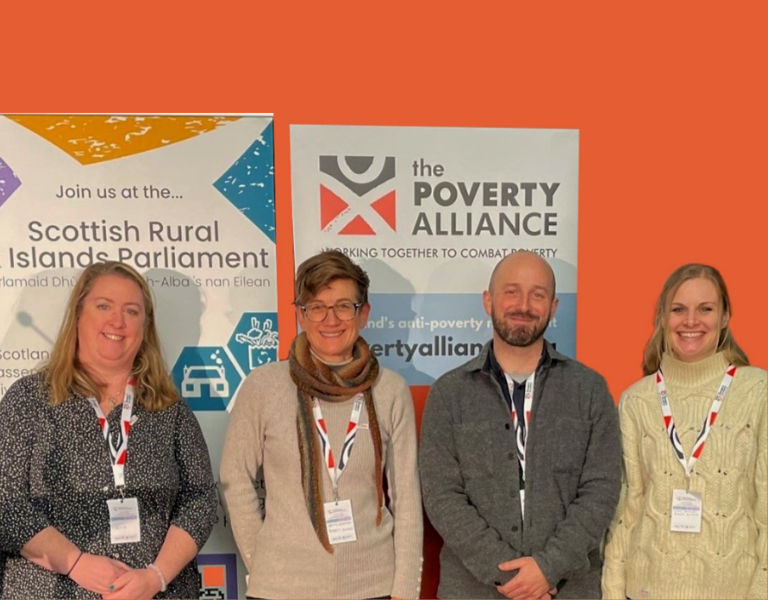
Taking Action on Rural Poverty Team, The Poverty Alliance
The Poverty Alliance’s new Taking Action on Rural Poverty team reflects on learning from the Scottish Rural and Islands Parliament (SRIP) and how it will feed into their project...
A 2023 report by Changeworks described how multiple factors combine in rural Scotland to create “a perfect storm” of fuel poverty. In our last blog we described our recent session at Scotland’s Rural and Island Parliament, where stakeholders from across Scotland’s regions and sectors came together to share their experiences of the rural poverty premium - the higher cost of essentials in rural areas that further increase hardship for those struggling on low incomes - and their ideas about how these excess living costs can be addressed.
Talking about housing, food, transport and energy and fuel at SRIP, the storm metaphor felt apt. Our discussions whirled back and forth between our topics – food prices and their supply chains are affected by fuel costs and precarious transport links. Improvements to home energy efficiency might depend what who owns the property, or what fuels are available. Given that all these costs have impacts on the cost of doing business too, will there even be a tradesperson to install new systems or to maintain or upgrade them later? The excess costs buffet you from all sides at once and limit your choices. In looking for answers, we also need to recognise that rural areas are not all alike: just as some places are prone to flooding and others exposed to high winds, the ‘topography’ of our communities shapes the challenges they face and the solutions that might work best. For example, in Sutherland – where distances are vast and travel options limited, community transport schemes play an increasingly vital role; whereas on Bressay in Shetland, Speldiburn community hub was set up to address the challenges of a shrinking, ageing population with limited on-island services. The diversity of issues we heard about brought home the need to understand more about what drives the rural poverty premium in different places so that we can identify the sorts of changes that could help reduce day to day costs.
Taking Action on Rural Poverty will bring people with direct experience of poverty together with community and voluntary organisations, the private sector and public bodies to identify and test solutions to the rural poverty premium. We will do this in two predominantly rural areas, Aberdeenshire and Argyll and Bute.
Across all of the topics at SRIP, the value of community led solutions was recognised in addressing rural challenges. But concerns were raised that they need to be properly resourced, and that grant funders often seem preoccupied with funding ‘innovation’ at the expense of tried and tested models. Where larger plans or frameworks are involved, the importance of co-design with rural communities was emphasised so that barriers can be designed out rather than worked around.
That’s why an important part of our work will be to enhance the processes by which people with experience of poverty and trauma can contribute to local decision making in rural areas.
The ideas we test will be determined by the communities and individuals we work with, but what might they look like? Let’s take the example of energy costs: our SRIP delegates spoke about the upfront costs of buying heating oil if you’re not on the gas grid. As suppliers seek to minimise the high delivery costs of long lorry journeys by road or ferry, rural and island households are often looking at a minimum purchase of over £500 a buyers’ collective to reduce these prohibitive upfront costs per household? In another area, the biggest problem seemed to be that standard energy advice doesn’t match the local housing stock – in which case the solution might be creating a resource that pulls together locally important information and sharing it through the right partners and channels.
Of course, the best ideas for testable changes will come through involving people with lived and learnt experience of weathering the storm in their communities. If you are based in Aberdeenshire or Argyll and Bute and have insights into the cost of living, or ideas that could make a difference locally, we’d love to hear from you. You can contact Annie McCormack (Development Officer for Aberdeenshire) or Becky Hothersall (Development Officer for Argyll and Bute).
Or if you’d like to contribute knowledge or insights at a broader level, please contact our Research Officer, Nicky Bowman or Policy Officer Ralph Hartley.

Enter your email address to receive regular e-updates about our work. If at any time you want to stop receiving these, simply contact us. We’ll keep your details safe and won’t share them with any other organisations for their marketing purposes. For full details see our Privacy Policy.